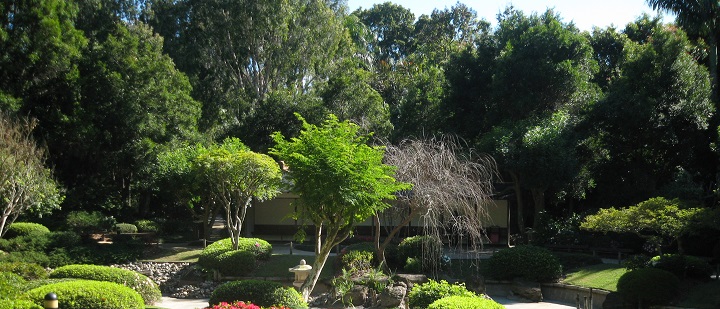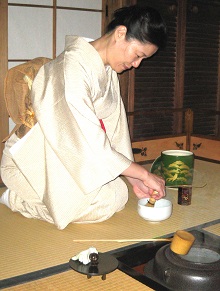茶道とは 〜What's is CHADO ?〜

茶道、茶の湯で知られている、お茶は何百年も日本の文化に影響を及ぼし、
多くの日本の芸術の頂点です。
よく見る、お茶を点てて、いただく、高度な様式化したパフォーマンスは、
より精神の瞑想の形であり、それこそが芸術であり、日々の喧騒、平凡さから離れ、
亭主と客でその一瞬の時を分かち合うこと、
そしてまた、詩や禅語が床の間にあり、花が花入れにあり、火は炉にあり、
手作りの道具や素晴らしい品々が選ばれ、それらもまた時を分かち合う、
これが茶道です。
千利休のしたことをまとめれば、茶道の定義として、
四つの概念
和、敬、静、寂 です。
【和】は人々と自然の調和を意味し、
【敬】は感謝の気持ちから起こる自然な敬意、
【静】は心身共の清潔さ、整然さ、
【寂】は この三つの概念を踏まえて日々稽古をすることでわかる静寂さです。
茶道はその経験を通して、感銘深い幸福と心の栄養を与えます。
Chado ,or the Way of Tea, also known as the Japanese tea ceremony,
has influenced Japanese culture for hundreds of years,
and is the pinnacle for many of the Japanese arts.
Often seen as a highly stylized performance in preparing and drinking tea,
chado is more a meditation on spirit, form and movement; an art in itself;
an escape from the complexities, rush, and ordinariness of daily life;
as well as the sharing of an experience in a single moment in time between host and guests―
and the poetry on the wall, the flowers in the vase, the fire in the hearth, hand-crafted utensils and the aesthetics of the choice of items.
Yet, as the founder of the Urasenke tea tradition, SEN RIKYU (1522-1591), said:
Perfection in the way of tea, simply a matter of boiling the water, making the tea and drinking/sharing it.
SEN RIKYU summarized the principles of chado in four concepts: Wa, Kei, Sei and Jaku.
Wa (Harmony) refers to a feeling of oneness with nature and people.
Kei (Respect) is the respect naturally resulting from a feeling of gratitude.
Sei (Purity) refers to cleanliness and orderliness, in both the physical and spiritual senses.
Jaku is the tranquility that comes from the constant practice of Wa, Kei, and Sei.
The Chado experience leaves one with a profound feeling of well-being and nourishes the soul.

